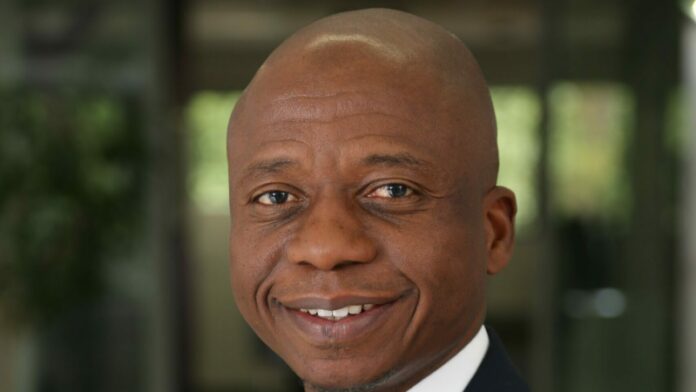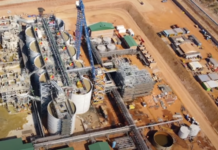
DIGITAL disruption has accelerated across many industry verticals. Mining houses are no different as technology solutions streamline operations, and increase visibility, safety, and real-time communication, resulting in more efficient, productive businesses. However, there remains the perception among some that technology adoption is synonymous with automation and job losses.
But, there are a growing number of mining houses who, along with their employees are embracing the value of digital solutions in addressing challenges and promoting well-being and opportunities in the work environment. In parallel, more mining leaders are using technology in a people-centric approach to amplify the impact of the workforce, increase engagement, and improve learning and development at all levels, thereby drawing employees into the digital world of possibilities.
Within this context, the Digital Co-X capability enabled the partnership between Vodacom Business, Standard Bank, and Kamoto Copper Company (KCC) in the Democratic Republic of Congo to place the Umoja Employee Engagement Application, powered by WyzeTalk, in the hands of all mineworkers. Umoja – which means ‘unity’ in Swahili – is a prime example of how connectivity solutions can foster employee engagement across an organisation and help to create a safer, healthier workplace.
“Connecting frontline employees to the internet and larger business, as well as to essential information needed for successful operations is one of the critical challenges facing the mining industry today. By turning to us at Vodacom Business, organisations can take advantage of digital solutions like Umoja, to open the door to new opportunities, transform the work environment and enable a better future for the business, employees and communities in which the mine operates. Our strategy supports Vodacom’s commitment to improving the lives of the next 100 million customers,” says William Mzimba, Chief Officer of Vodacom Business.
Enhancing employee engagement
In a Gallup workplace study, it was foud that only 15% of employees feel engaged at work, which can negatively affect output, staff turnover, safety, and compliance. Digital platforms can help mines engage with their employees by keeping employees informed while creating a culture of transparency and inclusivity. The Umoja App provides information on topics such as company news, job postings, celebratory milestones and important updates. This equips employees with a current and dynamic view of the whole organisation and helps them to recognise their contributions.
Many mines operate in remote areas, across geographic locations. In addition, many employees are now working according to a hybrid model. This can be challenging for employees who need to access and receive information, such as health and safety updates, payroll, management feedback, training, and compliance in real-time. With mobile technology, communication is possible between a scattered workforce, miners individually, or groups at a specific site, from anywhere at any time.
While communicating top-down is part of any mining organisation’s operations, technology opens the door to a collaborative working environment. This is pertinent to multi-national mining companies where face-to-face communication on the frontline is not always practical or possible, and different cultures and languages need to be considered. Providing a digital ‘suggestion box’, where employees can submit ideas, feedback, or questions can help to create an inclusive workplace. This allows for employees to feel that their opinions are valued while employers can review the data and implement any changes or provide support timeously. In addition, two-way communication can help to address operational inefficiencies to boost productivity.
Furthermore, digital technology can be used to provide online training to employees, which can be particularly beneficial in remote areas and across dispersed mining operations where traditional training methods may not be feasible. Therefore, mobile technology can help improve skills and knowledge while promoting employee development and growth.
Improving employee safety
In mining, a poor safety culture can lead to downtime, and in some cases, is the difference between life and death. Thankfully, in South Africa, mining fatalities reached a record low in 2021/22, according to the Department of Mineral Resources and Energy, as a result of industry interventions, including increased safety awareness and the advancement of technology.
Extending access to this mobile technology can improve safety within the workplace by providing employees with critical up-to-date health and safety information all at the touch of a button at any time. Furthermore, through connectivity solutions, training can be expanded to encompass the latest safe work practices, risk assessment, and incident reporting, and shift to a more interactive learning experience online.
There is also the potential extensiveintegration through the Internet of Things (IoT) to collect and analyse data for safer working conditions. Sensors or other monitoring systems gather data on environmental conditions, equipment usage, and incident reporting to identify trends and potential safety hazards while offering improvements to safety protocols.
Increasing access to connectivity solutions
Without access to connectivity mining employees won’t be able to experience the positive impact of technology. Improving connectivity in the remote areas in which mining operations typically take place is crucial as mobile technology is an enabler of digital solutions within the industry.
For example, Vodacom has placed significant emphasis on establishing reliable network connectivity to employees at KCC, and in the town of Kolwezi in the DRC .. Through implementing Vodacom’s Mobile Private Network solution at the mine, the surrounding community are also able to benefit from reliable high-speed connectivity, opening up the possibity of more digital technology in other businesses and at home. This is particularly significant as only 17% of the population in the DRC is estimated to have internet access, according to the World Bank. On top of providing connectivity, Vodacom Business also provided the community with the technology needed to capitalise on the their new network in the form of smartphones, data bundles and solar chargers. The intention here was to empower more employees to use the Umoja App and other online tools effectively from anywhere.
“At Vodacom Business, we believe that to harness the true potential of connectivity we need to foster strategic partnerships. The Umoja solution leverages the combined capabilities of Vodacom and Standard Bank and is powered and managed by Wyzetalk, a leader in digital employee engagement for frontline workers. The app includes an identity management solution from a Standard Bank Onehub partner iiDentifii. The connectivity platform issued to KCC employees will consequently bring their households and communities in which they live into the digital world, connecting them to new possibilities,” says Andy Wilson, Lead Partner: Digital Co-X at Vodacom Business.
Technology can serve as a vital link between frontline employees and the rest of the organisation, improving communications, skills development, and safety. Digital platforms like the Umoja App can be beneficial to workforce morale and well-being, empowering employees with information and greater scope for growth. In turning to Vodacom Business, mining organisations can leverage these connectivity solutions to create transformative opportunities where challenges previously lay.
Digital Co-X is a disruptive digital transformation capability within Vodacom Business. Our DCX transformation approach is the process by which companies embed digital technologies across their businesses to drive fundamental change.










